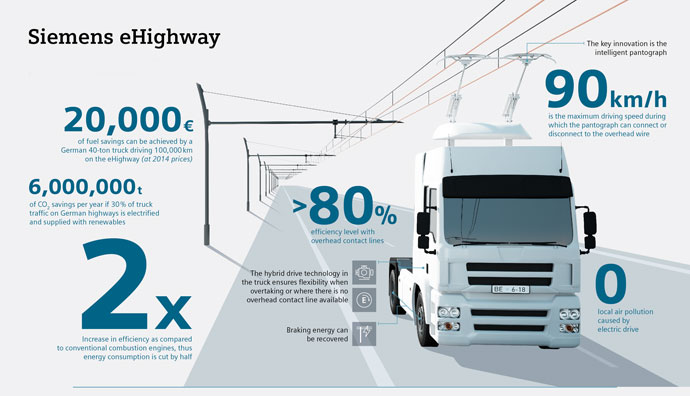
One day we may look back and wonder how 40-ton lorries were ever allowed to rumble through our villages and city streets. Though they make up only 3% of vehicles, lorries account for one quarter of Europe’s road transport emissions – a figure that’s expected to grow as traffic increases further. On top of that, heavy goods vehicles are involved in a disproportionate number of fatal crashes.
For its part, the engineering firm Siemens is helping to address one of these persistent threats. The company has developed what looks like an HGV tram hybrid. The company claims its eHighway is twice as efficient as internal combustion engines. Rather than rely on a large diesel engine that can return as few as four miles per gallon, this hybrid approach delivers electricity via overhead power cables. The result is that energy consumption is halved and local air pollution lessened.
The company has recently has been commissioned by the German state of Hesse to build an overhead contact line for electrified freight transport on a 10-kilometre stretch of motorway. The line will supply electricity for powering its electric hybrid trucks. The system will be installed on the A5 federal autobahn between Frankfurt Airport and the Darmstadt/Weiterstadt interchange.

A reduction in the emissions caused by HGVs, the fuel consumption of which can fall to low single figures, is welcome, but what of the other risks posed by heavy lorries? Year after year, heavy good vehicles are over represented in fatal collisions involving cyclists and pedestrians. In 2013, HGVs were involved in nine out of the fourteen incidents in London that resulted in the death of a cyclist. Some have called for outright bans on HGVs from city streets during working hours. At the very least, we need road rules and attitudes that make cycling in our cities something for everyone – rather than only the brave.
Speaking to the Telegraph in 2013, two years before his own mother was killed while on her bike by a dangerous driver, Chris Boardman said: “I think their use in cities needs to be managed. In more than 60 per cent of European cities, HGV movements are restricted. In Paris, for example, there are no articulated vehicles in the centre of the city and there were zero cycling deaths last year. There is huge evidence in favour of it. These things are not happy bedfellows for cyclists. They should be restricted and it can be done. All those cities across Europe that have done it seem to be working fine. The Mayor told me he would look into it. I don’t know whether he has, but I certainly can’t see any action.”
Can any HGV be safe for cyclists?
At the moment, the answer unfortunately is no. The best single piece of advice for cyclists in towns and cities is to be hyper aware of lorries at junctions and give them a wide berth whenever possible. It’s an example of the defensive riding that can help keep you safe, but why should the onus so often be on vulnerable road users?
Until we have the high quality infrastructure, road policing and legal framework to transform streets into places designed for people rather than motorised traffic, there must at the very least be mandatory safety equipment standards for the Heavy Goods Vehicles (HGVs) that operate on our roads to benefit cyclists and pedestrians. British law currently requires most HGVs to be fitted with side guards and extended view mirrors. However, certain HGVs, including construction vehicles are exempt from national regulations requiring side guards. Older HGVs are exempt from national regulations requiring mirrors.
Protection for you and your bike
ETA Cycle Insurance never devalues your bike, doesn’t charge extra for things like third party liability, personal accident or friends and family cover, and has a sympathetic policy on storage in sheds and garages.
For over 27 years we have been providing straightforward, affordable bicycle insurance and in 2017 we were voted to provide the most ethical insurance.
Find out more about why we are different. Get an instant quote or call our friendly team on 0333 000 1234.
Dudley Pickston
Roundabouts are becoming a problem. They are dangerous for cyclists and cause congestion. One solution might be to have a 20mph restriction on all busy roundabouts and a ‘merge in turn’ protocol. This would keep traffic moving smoothly.
Mark Kuramoto-Headey
“Can any HGV be safe for cyclists?”
I cycle and also have driven HGVs. Even in a car, I do not drive alongside them unless passing on a clear road or dual carriageway.
A car tried to pass me on a small roundabout and I very nearly crushed it. I hope I scared the driver into never doing it again (it certainly scared me). Junctions and roundabouts – just DON’T.